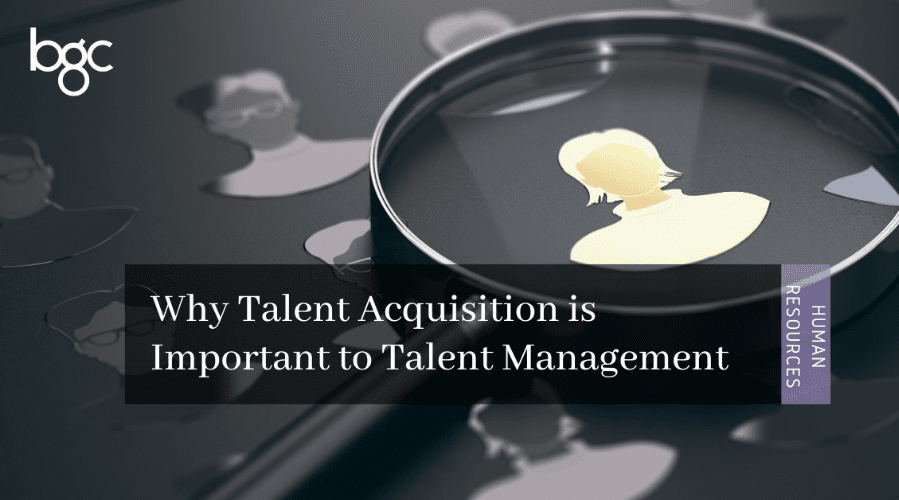It might come as a shock to some, but talent management is also an HR responsibility. The HR department makes hiring judgments based on the most suitable fit for a job.Talent management, on the other hand, takes a more comprehensive and longer way.
With talent management, you’re not just recruiting from a pool of candidates. You’re looking for a person who is fit for the company, including its goals, values, and culture. The center is on hiring, retaining, managing, training, and developing the best people.
To put it simply, talent management helps companies hire workers and anticipate turnover. Are you excited to learn more about the added benefits of talent acquisition? Thankfully, as an HR outsourcing agency we have the knowledge you need right here.
Understanding Talent Acquisition and Talent Management
Talent acquisition is the procedure of hiring and attracting trained employees to accomplish the company’s business requirements. The basic principle of talent management is to source and attract talents in the future, not just filling jobs they give. Additionally, talent acquisition supports many companies to build a workstation with trained and well-skilled employees.
Some benefits of talent management include:
● Recognizing talented applicants to fill tough to hire positions
● Improve your organization’s retention rate though plotting your employee’s career path
● Keeps your employees confident and motivated
●Coach and train in-house talents for potential leadership positions
It is important to choose the right people to hire as it can help you to achieve great success in the future. Companies who hire the wrong talent often suffer from monetary losses.
Other consequences of hiring the wrong talent include:
Repeating the process leads to a slower lead time. Not being able to find the ideal talent for your business will lead to an even slower lead hiring time. As such, the work output and productivity of your other employees might be affected too.
Investing in new employees who will quit early. It takes time to train new hires on company procedures, culture and policies. Investing in the wrong hire can lead the organization losing a lot of money as well as time acclimating and training them.
Raised hiring procedure costs. The entire hiring process is costly as it reoccurs over time. Many organizations spend a lot of money on marketing, skills tests, research, criminal background checks as well as job ads. Not to mention the extra energy and time used by your organization’s HR team to aid your company during the job search.
On the other hand, talent management often refers to the way an organization trains and develops these skilled hires. The right talent acquisition plan often leads to a better talent management outcome.
Conducting a Talent Acquisition Assessment Plan
As such, an in-depth assessment of your company’s talent requirements. Some ways to assess your company’s talent requirements include deciding on two criterias such as the eligibility and suitability criteria.
Eligibility criteria often refers to attributes such as years of experience, education, the skills needed and finally, the abilities needed to get the job done. Whilst suitability criteria refers to the more abstract attributes such as employee motivation, cultural fit, interests and perceived impact on company performance to name a few.
On top of that, the hiring managers and supervisors will need to determine important “make or break” criteria. This can include the pay and benefits the employee needs or even the type of job classification and description required.
Other essential factors that needs to be considered include:
The job description and classification
Where to source for applicants and resumes
How to evaluate your applicants to the best of your organization’s abilities
Deciding on the best employee benefits and pay to “woo” your applicants. This is an essential step when it comes to hiring from competitive industries such as Tech and IT.
Onboarding process for your employees.
Now that you understand the many benefits of conducting a talent management assessment plan. Let’s move on to why a good talent acquisition plan leads to a better future for your organization.
A Good Talent Acquisition Plan Leads to a Better Future
A great talent acquisition plan can lead to many benefits for your organization. The mistake that many companies often make is equating the idea of talent acquisition to recruitment. Unlike recruitment, talent acquisition leads to a lot more benefits.
A substantial talent acquisition plan can lead to:
Companies making the recruitment process a lot more engaging
Building a talent pipeline for future staffing requirements
Recruiting employees from a range of different industries and backgrounds
And finally, choosing the right talents to adopt and grow
As mentioned above, the right talent acquisition plan leads to a better outcome when it comes to talent management. One cannot exist without the other. Think about the type of goals and culture that your organization is looking to achieve. It all begins with the right talent.
Hiring the right talents is a time consuming process. Free up your HR team’s time, energy, and resources by outsourcing your talent acquisition process to a trusted recruitment service. For more information on the services we provide, visit BGC Group.
Read More: Understanding the Role of Talent Acquisition in Singapore
